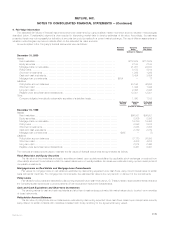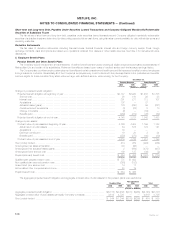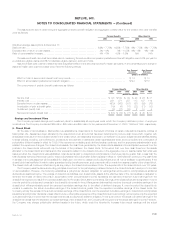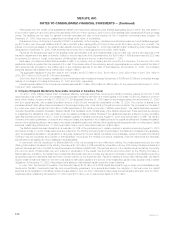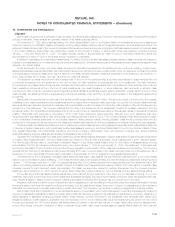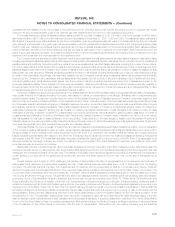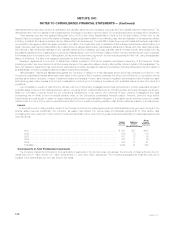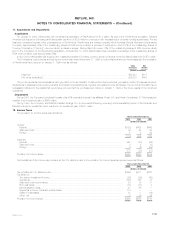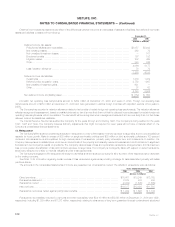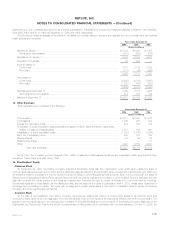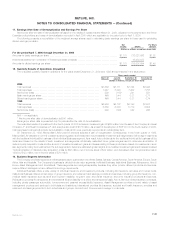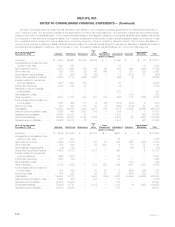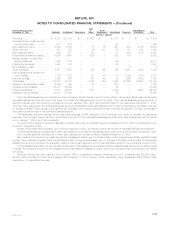MetLife 2000 Annual Report Download - page 56
Download and view the complete annual report
Please find page 56 of the 2000 MetLife annual report below. You can navigate through the pages in the report by either clicking on the pages listed below, or by using the keyword search tool below to find specific information within the annual report.METLIFE, INC.
NOTES TO CONSOLIDATED FINANCIAL STATEMENTS — (Continued)
10. Commitments and Contingencies
Litigation
Metropolitan Life is currently a defendant in approximately 500 lawsuits raising allegations of improper marketing and sales of individual life insurance
policies or annuities. These lawsuits are generally referred to as ‘‘sales practices claims.’’
On December 28, 1999, after a fairness hearing, the United States District Court for the Western District of Pennsylvania approved a class action
settlement resolving a multidistrict litigation proceeding involving alleged sales practices claims. No appeal was taken, and the settlement is final. The
settlement class includes most of the owners of permanent life insurance policies and annuity contracts or certificates issued pursuant to individual sales
in the United States by Metropolitan Life, Metropolitan Insurance and Annuity Company or Metropolitan Tower Life Insurance Company between
January 1, 1982 and December 31, 1997. The class includes owners of approximately six million in-force or terminated insurance policies and
approximately one million in-force or terminated annuity contracts or certificates.
In addition to dismissing the consolidated class actions, the District Court’s order also bars sales practices claims by class members with respect to
policies or annuities issued by the defendant insurers during the class period, effectively resolving all pending sales practices class actions against these
insurers in the United States.
Under the terms of the order, only those class members who excluded themselves from the settlement may continue an existing, or start a new,
sales practices lawsuit against Metropolitan Life, Metropolitan Insurance and Annuity Company or Metropolitan Tower Life Insurance Company for policies
or annuities issued during the class period. Approximately 20,000 class members elected to exclude themselves from the settlement. At December 31,
2000, approximately 300 of these ‘‘opt-outs’’ have filed new individual lawsuits.
The settlement provides three forms of relief. General relief, in the form of free death benefits, is provided automatically to class members who did
not exclude themselves from the settlement or who did not elect the claim evaluation procedures set forth in the settlement. The claim evaluation
procedures permit a class member to have a claim evaluated by a third party under procedures set forth in the settlement. Claim awards made under the
claim evaluation procedures will be in the form of policy adjustments, free death benefits or, in some instances, cash payments. In addition, class
members who have or had an ownership interest in specified policies will also automatically receive deferred acquisition cost tax relief in the form of free
death benefits. The settlement fixes the aggregate amounts that are available under each form of relief. Implementation of the class action settlement is
proceeding.
Metropolitan Life expects that the total cost of the settlement will be approximately $957 million. This amount is equal to the amount of the increase
in liabilities for the death benefits and policy adjustments and the present value of expected cash payments to be provided to included class members,
as well as attorneys’ fees and expenses and estimated other administrative costs, but does not include the cost of litigation with policyholders who are
excluded from the settlement. The Company believes that the cost of the settlement will be substantially covered by available reinsurance and the
provisions made in the consolidated financial statements, and thus will not have a material adverse effect on its business, results of operations or financial
position. Metropolitan Life made some recoveries in 2000 under those reinsurance agreements and, although there is no assurance that other
reinsurance claim submissions will be paid, Metropolitan Life believes payment is likely to occur. The Company believes it has made adequate provision
in the consolidated financial statements for all probable losses for sales practices claims, including litigation costs involving policyholders who are
excluded from the settlement as well as for the two class action settlements described in the two paragraphs immediately following the next paragraph.
The Metropolitan Life class action settlement did not resolve two putative class actions involving sales practices claims filed against Metropolitan Life
in Canada. A certified class action with conditionally certified subclasses is pending in the United States District Court for the Southern District of New
York against Metropolitan Life, Metropolitan Insurance and Annuity Company, Metropolitan Tower Life Insurance Company and various individual
defendants alleging improper sales abroad; settlement discussions are continuing.
Separate from the Metropolitan Life class action settlement, similar sales practices class action litigation against New England Mutual Life Insurance
Company (‘‘New England Mutual’’), with which Metropolitan Life merged in 1996, and General American, which was acquired in 2000, has been settled.
The New England Mutual case, a consolidated multidistrict litigation in the United States District Court for the District of Massachusetts, involves
approximately 600,000 life insurance policies sold during the period January 1, 1983 through August 31, 1996. The settlement of this case was
approved by the District Court in October 2000 and is not being appealed. Implementation of the class action settlement is proceeding. The Company
expects that the total cost of this settlement will be approximately $150 million. Approximately 2,400 class members opted-out of the settlement. As of
December 31, 2000, New England Mutual was a defendant in approximately 30 opt-out lawsuits involving sales practices claims.
The settlement of the consolidated multidistrict sales practices class action case against General American was approved by the United States
District Court for the Eastern District of Missouri. The General American case involves approximately 250,000 life insurance policies sold during the period
January 1, 1982 through December 31, 1996. One appeal has been filed. The Company expects that the approximate cost of the settlement will be $55
million, not including legal fees and costs for plaintiffs’ counsel. The District Court has scheduled a hearing in March 2001 with respect to plaintiffs’ class
counsels’ request for such fees and costs. Approximately 700 class members have elected to exclude themselves from the General American
settlement. As of December 31, 2000, General American was a defendant in approximately ten opt-out lawsuits involving sales practices claims.
In the past, some individual sales practices claims have been resolved through settlement, have been won by dispositive motions, or, in a few
instances, have gone to trial. Most of the current cases seek substantial damages, including in some cases punitive and treble damages and attorneys’
fees. Additional litigation relating to the Company’s marketing and sales of individual life insurance may be commenced in the future.
Regulatory authorities in a small number of states have had investigations or inquiries relating to Metropolitan Life’s, New England Mutual’s or General
American’s sales of individual life insurance policies or annuities. Over the past several years, these and a number of investigations by other regulatory
authorities were resolved for monetary payments and certain other relief. The Company may continue to resolve investigations in a similar manner.
Metropolitan Life is also a defendant in numerous lawsuits seeking compensatory and punitive damages for personal injuries allegedly caused by
exposure to asbestos or asbestos-containing products. Metropolitan Life has never engaged in the business of manufacturing, producing, distributing or
selling asbestos or asbestos-containing products. Rather, these lawsuits, currently numbering in the thousands, have principally been based upon
allegations relating to certain research, publication and other activities of one or more of Metropolitan Life’s employees during the period from the 1920’s
through approximately the 1950’s and alleging that Metropolitan Life learned or should have learned of certain health risks posed by asbestos and,
among other things, improperly publicized or failed to disclose those health risks. Legal theories asserted against Metropolitan Life have included
MetLife, Inc. F-25






